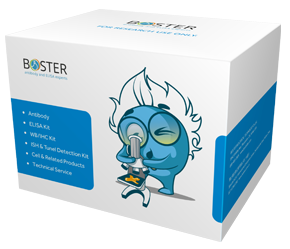Product Info Summary
| SKU: | A07084 |
|---|---|
| Size: | 100ul |
| Reactive Species: | Human, Mouse |
| Host: | Rabbit |
| Application: | IHC, WB |
Customers Who Bought This Also Bought
Product info
Product Name
Anti-RIPK4 Antibody
SKU/Catalog Number
A07084
Size
100ul
Form
Liquid
Description
Boster Bio Anti-RIPK4 Antibody catalog # A07084. Tested in WB,IHC applications. This antibody reacts with Human,Mouse.
Storage & Handling
Store at -20°C for one year. For short term storage and frequent use, store at 4°C for up to one month. Avoid repeated freeze-thaw cycles.
Cite This Product
Anti-RIPK4 Antibody (Boster Biological Technology, Pleasanton CA, USA, Catalog # A07084)
Host
Rabbit
Contents
Rabbit IgG, 1mg/ml in PBS with 0.02% sodium azide, 50% glycerol, pH7.2
Clonality
Polyclonal
Isotype
IgG
Immunogen
Recombinant fusion protein of human RIPK4(NP_065690.2).
*Blocking peptide can be purchased. Costs vary based on immunogen length. Contact us for pricing.
Reactive Species
A07084 is reactive to RIPK4 in Human, Mouse
Reconstitution
Calculated molecular weight
91611 MW
Antibody Validation
Boster validates all antibodies on WB, IHC, ICC, Immunofluorescence, and ELISA with known positive control and negative samples to ensure specificity and high affinity, including thorough antibody incubations.
Application & Images
Applications
A07084 is guaranteed for IHC, WB Boster Guarantee
Assay Dilutions Recommendation
The recommendations below provide a starting point for assay optimization. The actual working concentration varies and should be decided by the user.
WB: 1:500-1:2000
IHC: 1:100-1:200
Validation Images & Assay Conditions
There are currently no images for this product. We are working on uploading them please check back shortly or contact us to expedite our upload process for this antibody.
Protein Target Info & Infographic
Gene/Protein Information For RIPK4 (Source: Uniprot.org, NCBI)
Gene Name
RIPK4
Full Name
Receptor-interacting serine/threonine-protein kinase 4
Weight
91611 MW
Superfamily
protein kinase superfamily
Alternative Names
Receptor-interacting serine/threonine-protein kinase 4;2.7.11.1;Ankyrin repeat domain-containing protein 3;PKC-delta-interacting protein kinase;RIPK4;ANKRD3, DIK; RIPK4 ANKK2, ANKRD3, CHANDS, DIK, NKRD3, PKK, PPS2, RIP4 receptor interacting serine/threonine kinase 4 receptor-interacting serine/threonine-protein kinase 4|PKC-delta-interacting protein kinase|ankyrin repeat domain-containing protein 3|protein kinase C-associated kinase|serine/threonine-protein kinase ANKRD3
*If product is indicated to react with multiple species, protein info is based on the gene entry specified above in "Species".For more info on RIPK4, check out the RIPK4 Infographic

We have 30,000+ of these available, one for each gene! Check them out.
In this infographic, you will see the following information for RIPK4: database IDs, superfamily, protein function, synonyms, molecular weight, chromosomal locations, tissues of expression, subcellular locations, post-translational modifications, and related diseases, research areas & pathways. If you want to see more information included, or would like to contribute to it and be acknowledged, please contact [email protected].
Specific Publications For Anti-RIPK4 Antibody (A07084)
Hello CJ!
No publications found for A07084
*Do you have publications using this product? Share with us and receive a reward. Ask us for more details.
Recommended Resources
Here are featured tools and databases that you might find useful.
- Boster's Pathways Library
- Protein Databases
- Bioscience Research Protocol Resources
- Data Processing & Analysis Software
- Photo Editing Software
- Scientific Literature Resources
- Research Paper Management Tools
- Molecular Biology Software
- Primer Design Tools
- Bioinformatics Tools
- Phylogenetic Tree Analysis
Customer Reviews
Have you used Anti-RIPK4 Antibody?
Submit a review and receive an Amazon gift card.
- $30 for a review with an image
0 Reviews For Anti-RIPK4 Antibody
Customer Q&As
Have a question?
Find answers in Q&As, reviews.
Can't find your answer?
Submit your question




